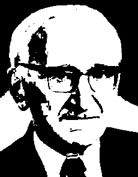Writings on F. A. Hayek
This is a review of Hayek's last book, the first volume in a new series of Hayek's collected works. The book was heavily edited by William W Bartley who was also the general editor of the series until he died in 1990. Not all admirers of Hayek were happy with this book because they regarded it as a retreat from robust individualism.
This provides an overview of a collection of papers written for the 50th anniversary of the publication of Hayek's timely tract. The contributors highlight some of the successes that were won by this book, while others point to work that remains to be done.
In this essay I explore some of the common ground and the differences between people in different groups that are regarded as the political 'right'.
An introduction to the ideas of Menger, Mises and Hayek, with others who have provided an alternative method of approach to economics and the social sciences.
This paper suggests that Popper's theory of metaphysical research programs provides powerful support for the Austrian approach to economics and the human sciences.
Hayek's important statement on the difference between his political philosophy and a position which is often regarded as the only alternative to left-wing radicalism.
There is a saying, "If you are not a socialist at 20 you have no heart, and if you are still a socialist at 40 you have no brain".
Following this position statement from Hayek, that saying is a no-brainer. There is no need for young people to be stampeded into leftwing radicalism as a reaction to the rigidity and authoritarianism of many conservatives.
Review of a particularly good book by an Australian, Chandran Kukathas, highlighting the various strangths and weaknesses of our greatest modern liberal.
A draft paper on the achievement and then the lost opportunity when Parsons reinvented the Austrian wheel of the action frame of reference in the 1930s which could have converged with Mises on praxeology and Popper's situational analysis to re-integrate and re-invigorate the social sciences.
A draft paper on the achievement and then the lost opportunity when Parsons reinvented the Austrian wheel of the action frame of reference in the 1930s which could have converged with Mises on praxeology and Popper's situational analysis to re-integrate and re-invigorate the social sciences.
on f.a.hayek.
"It is not who governs but what government
is entitled to do that seems to me the essential problem."

